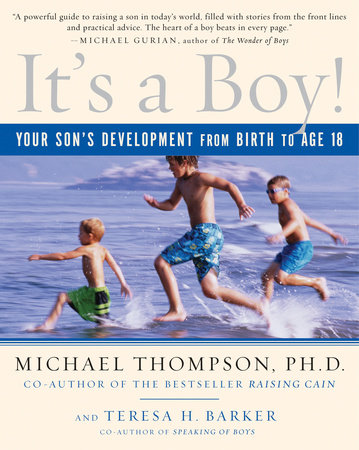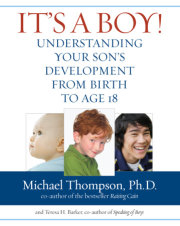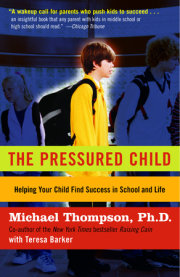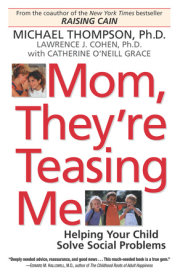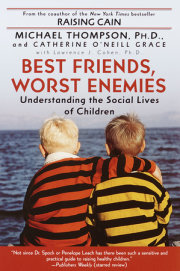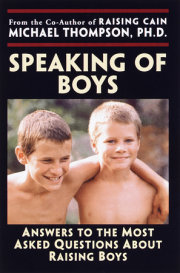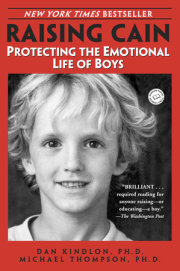Chapter One
IMAGINING A BOY
What Were You Thinking?
ANDREW’S PARENTS ARE GRAPPLING WITH THE ISSUES that occupy the mind of every loving parent. They aren’t sure how to strike a healthy balance in their son’s life between sports and academics, music and video games, friends and family time. Should they let him watch TV before he cleans up his room? When should they stand firm and when should they let their son decide for himself? They agree it’s too early to think about college. But while they don’t want to pressure him about eventual career choices, the family business does have his name on it. “We’ll just take a wait-and-see approach,” his mother says gamely as she pats her very pregnant belly. It is two weeks before Andrew’s due date. As for Andrew, he mostly busies himself making wide turns in utero, the bulge of his tiny foot tracing an impressive arc across his mother’s midriff.
Perhaps you, too, are expecting a boy. And if he is your first child or the first boy in your growing family, your curiosity and concerns about a boy’s life fill your thoughts and conversations. You have heard other mothers say, “They really are different!” And, of course, they are. If they weren’t, there would be no point at all in my writing this book. “Boys are easier than girls,” you hear. “Boys are an open book.” “Boys love their mothers.” But then what do you make of all those stories about boys being uncommunicative, behaving badly or struggling through school, stifling their inner life or losing themselves on the way to becoming men?
If this is your first foray into the intimate life of boys, you may be excited or nervous at the prospect. If you already have a son, or you had brothers, or you are a dad and remember your own boyhood, then your outlook on parenting a boy may have you feeling all the more confident and encouraged—or wary, bracing for the worst.
Perhaps you are the mother of a five-year-old boy and you are feeling a bit edgy about his interests. “My son really likes to play with guns,” one mother told me. “I don’t like them and I won’t allow them in the house, so one day at breakfast he made a gun with his finger and his thumb and he ‘shot’ his brother with it! Why does he keep doing that?”
If you are that mother, you may be worried that, despite your great love for your son and the good home in which he is being raised, his interest in guns is a sign that he’s going to grow up to be violent and dangerous. That’s an uncomfortable feeling.
Perhaps you are the mother of a two-year-old and your little boy is suddenly beginning to seem different to you. He is starting to disobey you, to look right at you when he breaks a rule or touches something he’s not supposed to touch. He laughs gleefully when you scold him. He seems so willful and defiant. Is that normal?
Or perhaps you are the mother of an older boy who has begun to pull away from you into a boys-only world that is clearly off-limits to moms. The goodnight chats are getting shorter and details of his day less forthcoming. You’ve heard that happens with boys, but you and your son have been so close—surely not him, not yet!
If you are a dad, perhaps you are not too proud to admit that you are a bit nervous about raising a boy, even though you were a boy yourself and you should, theoretically, know all about it. Maybe you had a hard time as a boy or have mixed feelings about your father, and you want it to be different for your son. Or perhaps you were a lucky boy and a lucky man, an enthusiastic dad who wants to get it right for your son. If you are a dad or father-to-be and you are making this effort to deepen your understanding about the life of boys, then your son is already a lucky boy, too.
Once you accept the miracle of a child coming into your life, once you embrace the humbling journey that parenting is for all of us, the question that drives nearly every conversation about boys, whether you are expecting your first or you have a houseful of them, is: What makes boys tick?
Development is the fundamental engine of a child’s growth, the ongoing process in which nature, nurture, and sheer luck come together and a unique human being emerges. The biological story of growth and advice about prenatal health and the day-to-day care and feeding of infants and children are well covered in general parenting literature and medical checkups. We’re here to focus on the psychological development of boys, the inside story of how a boy’s inner life takes shape and progresses through infancy, childhood, and adolescence. It’s a process that isn’t always easy to see or understand, not because boys intentionally hide it (though they attempt to do so at times) but because they show it in ways that adults don’t always recognize. But it’s all there. In everyday life with boys they are always onstage, showing us what’s new. Against that developmental backdrop, in the chapters ahead we’ll examine the key issues of psychological development that dominate each stage because that is, for you and your son, where the greatest challenges and drama of childhood—and parenting—play out.
If pregnancy and parenthood have left you much time to think, you are full of expectations and wonderings about your boy. You are imagining your son as he will be in six months or two years or twenty years. You may be reading a lot of parenting literature and hearing advice from family, friends, and total strangers. And every day in the news there is another research finding about child or adolescent brain science and gender differences, but very little on their actual relevance to raising your son. How do you turn all that into intelligent, intuitive parenting for raising a boy? How do you begin to answer the two most important questions for the next eighteen years: What do boys need? What is my son going to need from me?
Those are questions we’ll address in the pages ahead, but before we do that, let’s look back to the time when your thoughts about boys first took shape long ago.
You may feel newly called to this deep exploration of the inner life of boys, but I want to suggest the surprising idea that you have been thinking about what makes boys tick all of your life, or almost all of it. Thinking about having a baby someday—and imagining that baby as a boy or a girl—is one of the most basic of all human thoughts. It starts early in life. As soon as they can talk and engage in imaginary play, children—boys as well as girls—begin to enact the role of parent, first by themselves and then alongside other children, imitating the actions of the mothers and fathers they love and watch intently every day.
Most of us don’t remember what we played when we were three or four years old. That is why I want to remind you that you almost certainly did engage in some version of this domestic role-playing game, taking the role of a mom or dad, rocking a baby doll (or, if you were a boy, perhaps dismantling it or making it fly like a superhero or roll in the mud), and holding forth on what boys like and girls prefer. You “played doctor,” asking bold, uncensored questions about body parts, making mental notes. You continued as a child to school yourself in a child’s everyday version of gender studies, offering your expertise to any parent, teacher, or other child whom you felt was short on insight. From the age of five, when her younger brother arrived, my daughter, Joanna, objected to anything we did for our son, Will, that didn’t seem properly masculine to her. “Mom, that’s not for boys,” she would declare about a toy or an outfit that was too androgynous to pass her gender test. She was afraid that we wouldn’t raise our son in the right way.
In school, if you were a girl, you may remember complaining to a teacher about a bothersome boy—the noisy, pesky, clumsy, or fidgety boy, the boy who bugged you to distraction. Or you might recall disliking boys in a group, especially when they chased you and your friends on the playground or, perhaps in your teens, when you found them aggravating or baffling for different reasons.
If you were a boy, you remember how it felt to posture (or try to) around girls. You may have refused to play a game or do something someone suggested, protesting loudly, “That’s for girls!” or “We don’t want to be in reading groups with girls,” a solid declaration of what eight-year-old boys like and what they hate.
These childhood examples of how we came to know boys or imagine boys’ needs or wants may seem far removed from the adult reality of parenting a boy. They are not. Our childhood experiences form a huge reservoir of memories, thoughts, dreams, and feelings, many of them unconscious, that we bring to bear in parenting our own child. Whether we remember those moments or not, we have been coming to conclusions about boys our entire lives, and as a result, we have some pretty strong opinions—I call them imaginings—about what boys will be like, how easy or hard they are to raise, or what they might need as they grow up.
In the thirteenth century, Vincent of Beauvais, author of the Speculum Maius, the great encyclopedia of the Middle Ages, observed, “Woman is man’s confusion.” It seems to me that the obverse is also true: man—and thus boy—is woman’s confusion. So, along with the general activity and demands of parenting a boy, mothers face that formidable gender gap and the unique, ongoing challenges and sweet rewards that come with it. And what about fathers, with the home advantage of gender affinity? Any honest father will admit that gender familiarity breeds its own kind of challenges and rewards—and sometimes no less confusion.
The sex of your child, then, is going to pull all of this out of you: your history as a male or female, your experience, your likes and dislikes. It will draw on your deepest feelings about your father, your brother, and, if you are a mother, everything that has ever gone on with your husband. The fact that your child is a boy is going to shape your life and change your psychology forever—and not just the way you feel about boys. Brain research shows that raising children shapes the way you think—neurologically—about them, too. Hormones and mirror neurons develop a sensitive biochemical circuitry that creates new connections and pathways in response to experience. We don’t just experience parenthood; parenthood shapes all of our experiences. With this brain-mind-body linkage in place, and imaginings already in progress, it doesn’t take much to push the “boy button” in your psyche and set all your personal preformed “boy” psychology into motion.
Once you’ve got a baby on the way, the simplest question in the world— Is it a boy or a girl?—is fraught with implications. The question can set off a flood of feelings about boys that may include some positive ones, a number that are unhappy, and some that are ambivalent. A woman whose father had died when she was young told me she felt “both pride and intense anxiety” when she found out she was having a boy:
I was raised, essentially, entirely by women in a family of women. . . . Men and boys always fascinated me, and I’ve always loved them, been fond of them—but they always seemed exotic, hairy, wild, noisy, unpredictable, with their big voices and big stories. Great fun, absolutely delightful—couldn’t do without them. But also a little scary. The thought that I had to parent one of these was very intimidating.
Another mom described the chorus of concerns the news triggered for her:
Panic mode! I had some anxiety about raising a male child myself. I am married to a wonderful man who is a terrific father, and it was not his capabilities I questioned, it was my own. “Old tape” is hard to stop replaying.
Each of us has “old tape” when it comes to boys, and parenting a boy— even just thinking about becoming the parent of a boy—pushes the play button. This mother felt she was “particularly sensitive to gender preference,” but parents who say they have no strong preference about gender are nonetheless full of feeling about it, full of imaginings, as these mothers share:
At first I was thrilled to learn I was having a boy, and then suddenly worried that he would have to go to war someday.
I was shocked. I thought it was a girl. A boy? A boy? What would I do with a boy?
I prayed for a son because I didn’t want to go through the terrible turmoil my mother and I had experienced, especially when I hit puberty. But I also always loved the idea of a boy. A boy seemed like a child I could roughhouse with more easily.
What if, for any of a number of reasons, the thought of having a boy was close to unimaginable for you? One mother recalled that when she found out she was carrying a boy, she felt “a little worried because boys seemed so much more boisterous than girls.” She also worried, she said, because “he would be an ‘other’ just by the very fact of him being a different sex than me. How would that be?”
Author Andrea Buchanan, in her introduction to a collection of essays by mothers of sons, wrote, “Long before I got pregnant, I began to fantasize about my imaginary daughter. I rarely imagined having a son. So a few weeks ago, when the ultrasound technician’s pointer indicated my unborn son’s rather obvious pointer, I was as shocked as I have ever been in my life.”
As shocked as I have ever been in my life—that’s saying a lot, and I think it speaks to the power of our expectations. How do you fall in love with someone, even a baby, who has so upset your expectations? How do you turn on a dime when your fantasies of the future have been so disrupted?
The mother of a young son, pregnant for a second time, cried when the prenatal test showed this child to be a boy: “I was saddened that I would never have a girl—a child in my likeness.” Another mother described her attitude adjustment: “I had my heart set on having a girl and I cried when I found out it was a boy. . . . But by the time he was born, I didn’t care one way or the other.”
Copyright © 2008 by Michael Thompson, Ph.D.. All rights reserved. No part of this excerpt may be reproduced or reprinted without permission in writing from the publisher.

